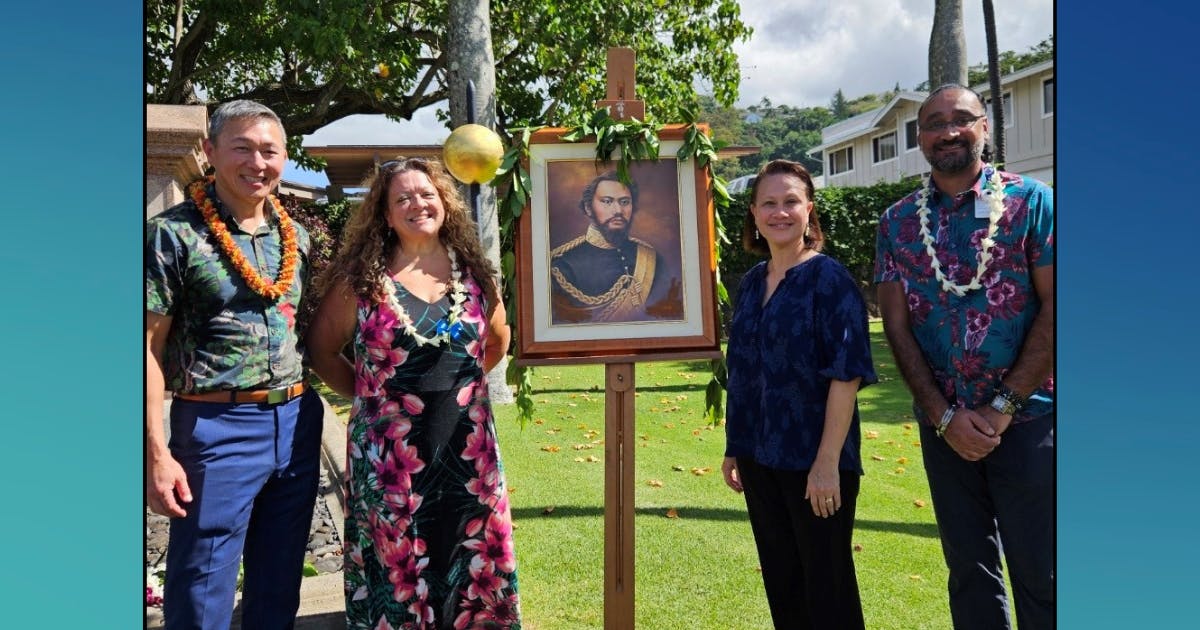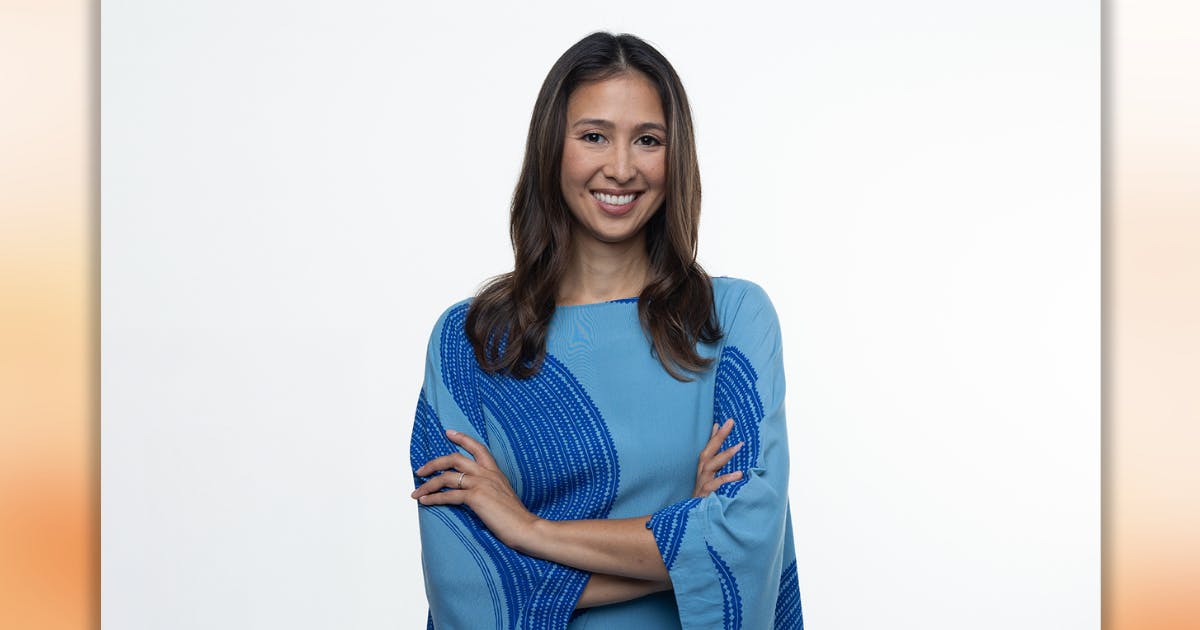
Nicole Velasco is the business development lead for NORESCO, an energy services company.
On the morning of our original interview with Omidyar Fellow Nicole Velasco, she texted that she had to reschedule.
“So sorry but I’m working thru the end of food poisoning… ironically NOT the condition of health and wellness!” her text read.
“Part of it is I’m pregnant,” she shared when we finally connected over Zoom a couple weeks later, “and from a scientific medical perspective, I’m considered immunocompromised. Any shifts in diet or if something is not cooked all the way through can cause issues.”
The culprit? A steak plate that was only cooked to medium. “My body very intelligently decided ‘no, thank you,’” she laughs, “but even though I was physically incapacitated, fortunately, the baby is totally fine.”
While a bout with food poisoning while pregnant is certainly rough on the body, Nicole was faced with a more serious health scare in the past. Like many other busy professionals, back then she had put off going to the doctor.
“I don’t have time; when am I going to schedule them?” she remembers telling herself.
It wasn’t until she found out near the end of 2016 that she was being released from her position with the City and County of Honolulu administration—and would be losing her health insurance—that she finally started making appointments. Those doctor visits unveiled a startling discovery: she had developed precancerous cells.
"...who we are and what we do are not the same thing.... But when you spend so much of your life being seen for the things that you do, it takes time to uncouple that from who you actually are.”
Her doctor told her that she needed to do something about it now or in 15 years, her life could be at risk.
“OK, what do I do?” she recalls asking. “Give me the plan. Give me the strategy of how I get rid of this problem, because it’s really interfering with my efficiency and my productivity.”
The response was brief and direct: “Just don’t be stressed.”
“That is one of the most infuriating things I’ve ever heard in my life,” she rants. “What does that even mean? What is this that you’ve told me? Nothing!”
If the end of her employment, an alarming medical diagnosis, and a subsequent surgery weren’t enough cause for anxiety, she was still reeling from the aftermath and legal troubles of leaving an abusive relationship. “[It was] very damaging—psychological and emotional abuse,” she says. Everything had taken a toll on her.
“I watched these big pieces of my life—personally and professionally—just fall apart,” she says. “And when the infrastructure of your life falls apart, even if they are unhealthy and not actually conducive to your health and wellness, it’s kind of an unnerving place to be.”
“If you’re in a role of leadership, how you manage stress and how you address it is 100% informing your team about how they should also take care of themselves.”
Connecting with her Tribe
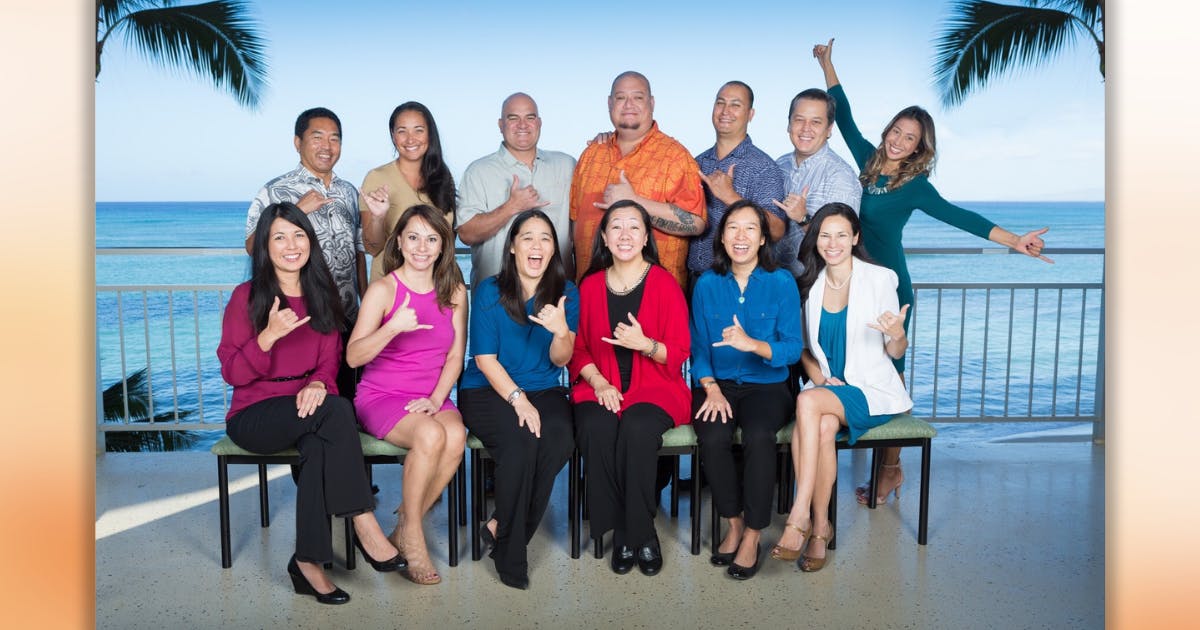
Omidyar Fellows Cohort V, also known as Tribe V, at the start of the curriculum in 2016.
Coincidentally, this was all happening shortly after she found out she was accepted into Cohort V—who affectionately refer to themselves as “Tribe V”—of the Omidyar Fellows program.
“That ended up really changing the course of how 2016 and 2017 transpired,” she affirms.
She found herself grateful to have a reason “where I just needed to show up, because there were moments in that time period where all I could do was just show up. Just make sure I got to the Hawai‘i Leadership Forum office, and I sat down, and I was in that space.”
She also remembers of the curriculum sessions “just being safe, being in a safe space and knowing I was being cared for and also having a container that was going to hold me, but also allow me to start thinking expansively. We often talk about systems change broadly, but this was also an opportunity to think about my internal systems change.”
“Whether it was the curriculum, the HLF staff, and then my actual Cohort—” she pauses for a long moment, a wave of emotion rushing over her before she continues. “They were gifts. These structures, systems, this family—literally kept me alive. The cookies in the back of the room kept me alive. The curriculum that gave me permission to think about something else when it was absolute hell kept me alive. The people in my cohort who stuck with me and kept me going kept me alive.”
Fortunately, at the beginning of 2017, Nicole underwent surgery to remove the precancerous cells. At the same time, she also had to remove what she calls a “malignant mental framework where I thought that not taking care of myself was the correct path because I had all these other things to do,” and instead “make me the thing I worked on.”
“I find that for a lot of us, it takes that moment of truth to say, ‘yeah, I have to do something different.’”
Doing so also proved to be an arduous task for Nicole at first.
Separating Herself from Her Work for a Path Forward
After the surgery and finding herself without a job, she was challenged to take a break for a month where she wouldn’t start any new projects or take on any new roles.
“It almost sounds like when I was told, ‘just don’t be stressed.’ What does that mean? I didn’t know what that meant [to take a break],” as she says she was then “completely driven by productivity.”
The first week was rough. “I woke up every day thinking, ‘What am I doing? I’m not doing anything!’” she recounts. “It was a process of decoupling who I am, my identity, and my worth away from the things that I do.
“At the most basic foundation,” she continues, �“who we are and what we do are not the same thing. They can inform each other, but they’re not the same thing. But when you spend so much of your life being seen for the things that you do, it takes time to uncouple that from who you actually are.”
She persisted with her challenge—intentionally practicing doing nothing for a month, then two months, then three. She focused on her health and recovery, and she turned to another one of her longtime practices: yoga. She’s been a practitioner since her paddling days in high school and completed her yoga teacher training in 2016. “Once you become aware of aspects of who you are, your physical body, and your intuition that you may not have paid as much attention to—once you know, you can’t not know. It becomes something that’s always available to you.”
She also leaned on the community she was building within the Omidyar Fellows program and Tribe V. “I really have to thank my ethereal tribe,” she says. “It was divine timing to have the privilege of being in cohort while this was all going down.”
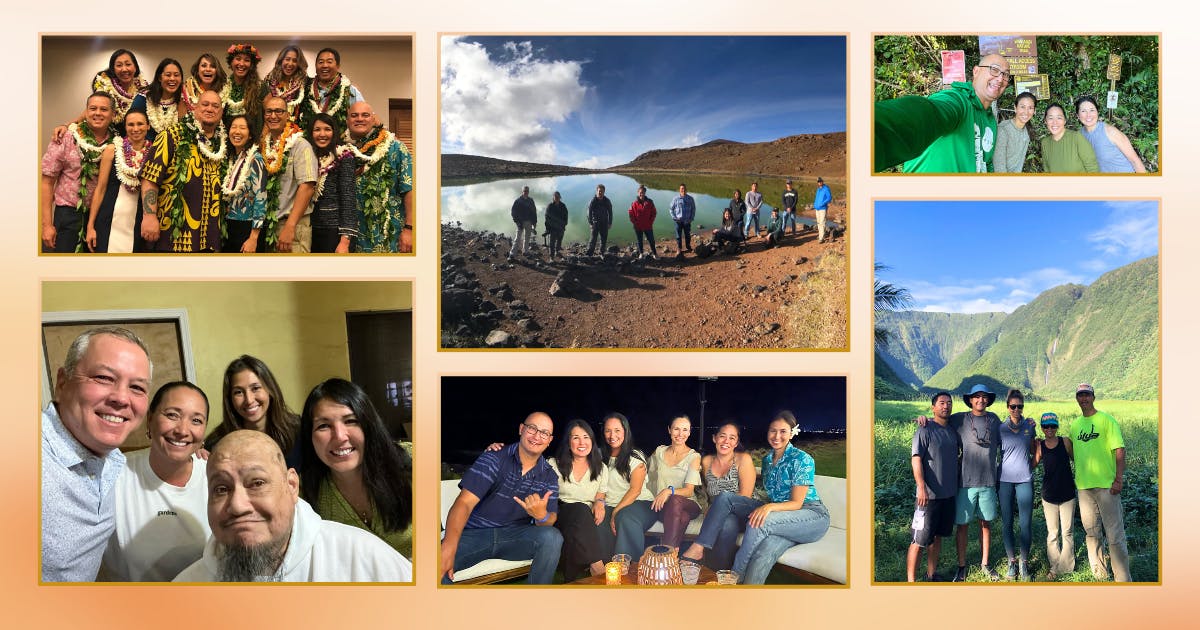
Even after their curriculum had completed, Tribe V continues to maintain a strong bond.
Photos courtesy Nicole Velasco
She adds that she “needed to sit with the discomfort to find a way home, come back to who I am, so that whatever came next was informed from an internal place, and not the imposition of external needs.”
Sure enough, shortly after her break, she was offered an opportunity to work on business development with NORESCO, an energy services company that helps to create more efficient facilities, systems, and processes that improve sustainability and resiliency.
“Taking the position was informed by getting clarity on my own personal non-negotiables and the ways that I now understood how I wanted to live,” she explains. March 2025 marked her eighth anniversary with the organization.
In addition to NORESCO, Nicole is currently developing other projects in the sustainability and conservation space. She also serves as lead co-facilitator for Hawai‘i Leadership Forum’s newest program offering, Leaders Lab.
The common thread in all her efforts is building community and reciprocal relationships.
“Each one is in service of an aspect of who I am and my values,” she says. “For NORESCO, it’s thinking about what it means to do right with what we have and do work that creates a better circumstance for our collective. For the projects, very similarly, it’s how we rebalance the ways we collectively benefit from and take care of ‘āina. And for Leaders Lab, it’s how we give and allow for others to find benefit from that which we have benefitted ourselves [as Omidyar Fellows], and how we invest in people who have committed to Hawai‘i.”
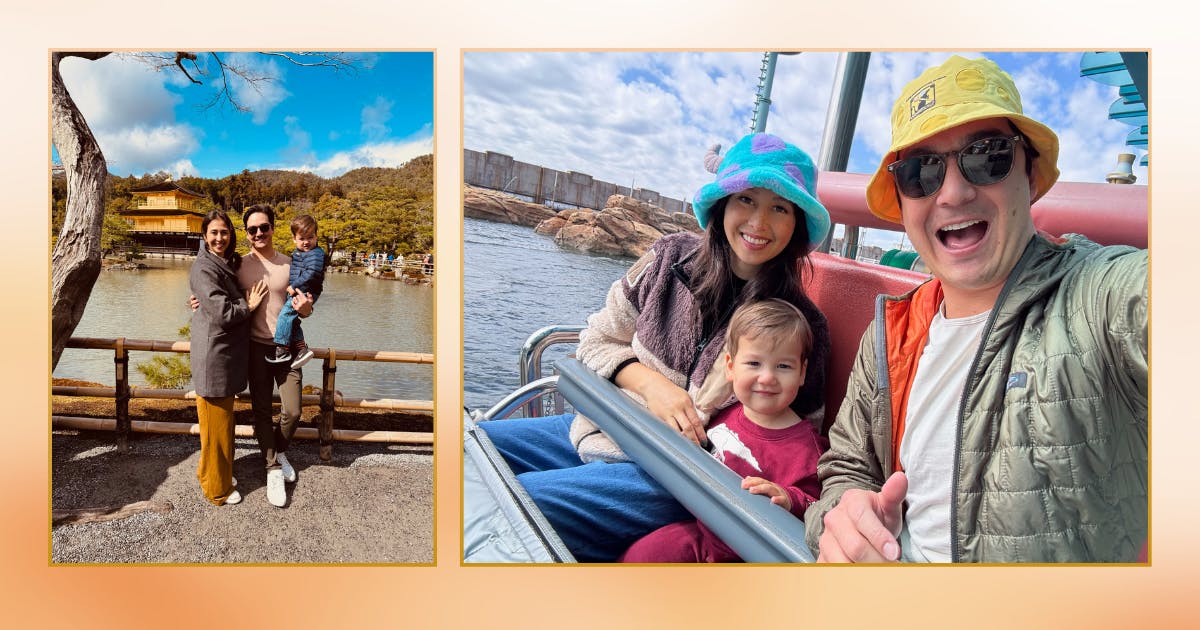
Nicole, her husband, Brendan, and their son, Walden.
Photo courtesy Nicole Velasco
Even with all these responsibilities, Nicole knows her “most important startups” have been creating life. She is mom to two-year-old Walden (who goes by the nickname “Wally”). She and her husband, Brendan, are expecting baby number two this summer.
“It’s been such an interesting experience,” she says of motherhood. “You really have to think about what does it mean to give, and what is that process by which you understand, and perhaps even grow your capacity for caring and nurturing,” adding that “it has also been an opportunity to reflect on how I do that for myself so that I can maintain that capacity to care for others.”
“For those who are moving through fast-paced positions, at some point you realize that if you don’t take care of yourself, if you don’t make that important, then you cannot by any means appropriately or efficiently care for others.”
“...being Wally’s mom, the value of play has been instrumental to my own health and wellness. So now, I am saying ‘yes, let’s go hike and find puddles and rocks.’”
Listening to Her Body and Her Keiki
Today, Nicole has shifted her approach for many other things compared to a decade ago.
“One of the biggest lessons for me has been that your body will tell you what you need if you listen,” she says. “So many of us have been prized for our cerebral capacity that we can override this otherwise highly intelligent aspect of our body consciousness.”
She mentions checking in with her body and staying attuned to what it needs. Sometimes it’s rest—whether mental, physical, or emotional. But sometimes, it’s movement that her body craves.
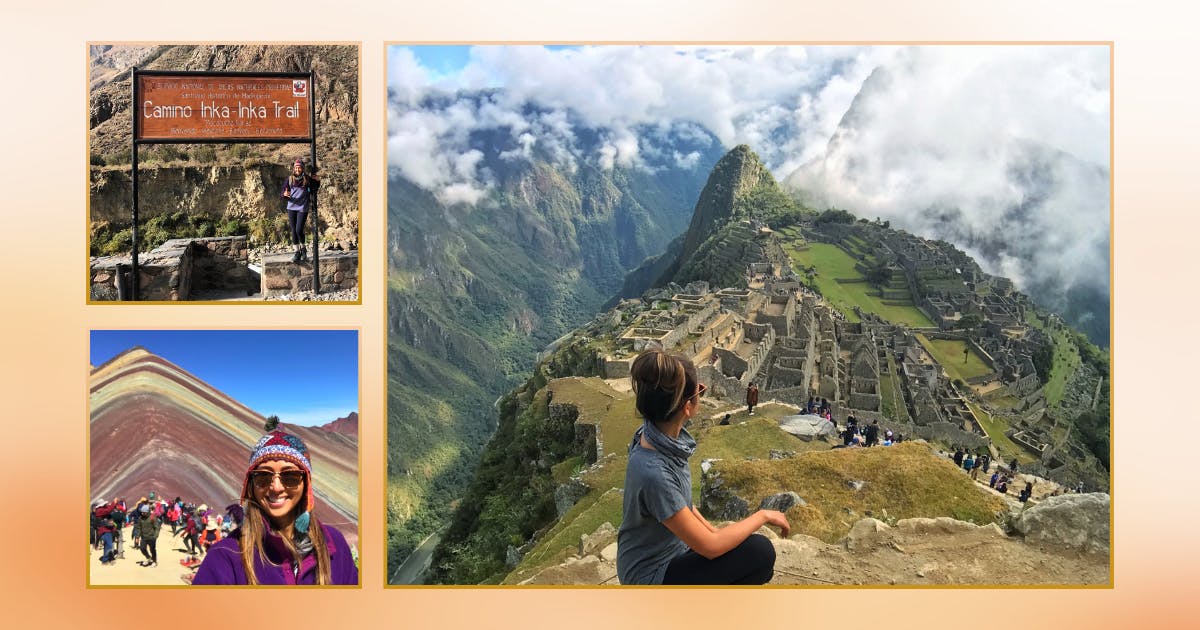
Nicole hiked to Machu Picchu in Peru for her 2017 trek.
Photo courtesy Nicole Velasco
Besides yoga, Nicole is an avid runner, though she admits more recently it has been “more of a soft jog or a brisk walk” with the pregnancy. As a lifelong hiker, she has trained for an annual trek since 2016, though she now also opts for shorter day hikes during this season of her life.
“With any physical practice, you learn a lot about how your limitations are different one day to another,” she says. “It’s really a matter of honing that mental awareness of your physicality. It’s also about being in concert with ‘āina itself.”
She involves her family in these practices as much as she can, sometimes with unexpected—and funny—results.
“We tried to go hiking,” she laughs, “but we got about 10 minutes in, and Wally found a puddle and a rock. We didn’t move for 25 minutes, so it was a very short hike.”
Wally has also helped in refreshing her perspective on self care.
“Parenthood has been a great reminder of the other things that we let go in adulthood,” she says. “Like, when’s the last time you played? Why would I play? I don’t have time to play. And then you realize that play is an essential component. It doesn’t necessarily mean playing with blocks. It could be fishing, or hiking, or traveling. But being Wally’s mom, the value of play has been instrumental to my own health and wellness. So now, I am saying ‘yes, let’s go hike and find puddles and rocks.’”
“Wally’s also asking me, ‘Hey, will you play with me? Can we play?’” she adds. “I think how we respond to those simple inquiries is very informative.”
‘Coming Back Home to Yourself’
To Nicole, all these transformations over the years, and through the Omidyar Fellows program, have been what she calls a “homecoming” for her, describing it as “coming back home to yourself so that you can go and do the things you’re meant to do and do that kind of big, heavy work alongside others.”
“Whether it was the curriculum, the HLF staff, and then my actual Cohort— They were gifts. These structures, systems, this family—literally kept me alive. The cookies in the back of the room kept me alive. The curriculum that gave me permission to think about something else when it was absolute hell kept me alive. The people in my cohort who stuck with me and kept me going kept me alive.”
“I feel more like myself now than I did in 2015, for sure,” she says.
She says her call to action for others is to pay attention to their needs, bodies, and stress levels, and to act before it’s too late.
“Don’t wait until that point where it’s so dire that you don’t have options,” she says. “We have the opportunity to decide before things get so bad from a health perspective.”
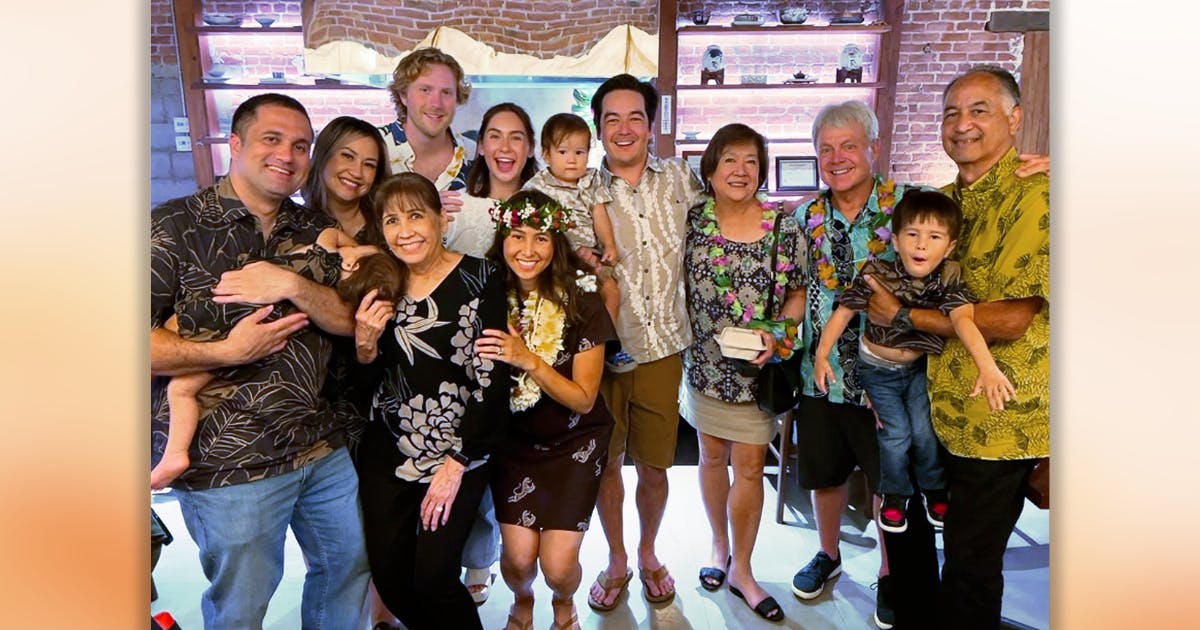
Nicole celebrates her birthday with family and friends.
Photo courtesy Nicole Velasco
“If we really care about taking care of family, taking care of community, taking care of ‘āina, then how we do that for ourselves is going to dictate how we do that for those around us.” She adds “if you’re in a role of leadership, how you manage stress and how you address it is 100% informing your team about how they should also take care of themselves. You cannot lead with your highest, best self if you’re not taking care of yourself.”
Nicole’s parting advice, to herself and to us all: “You’re worth it.”
This story appears in the March & April 2025 issue of Taking on Tomorrow.
Stephany Vaioleti reveals plans for The Queen’s Health Systems new 80-bed hospital on Hawai‘i Island.
